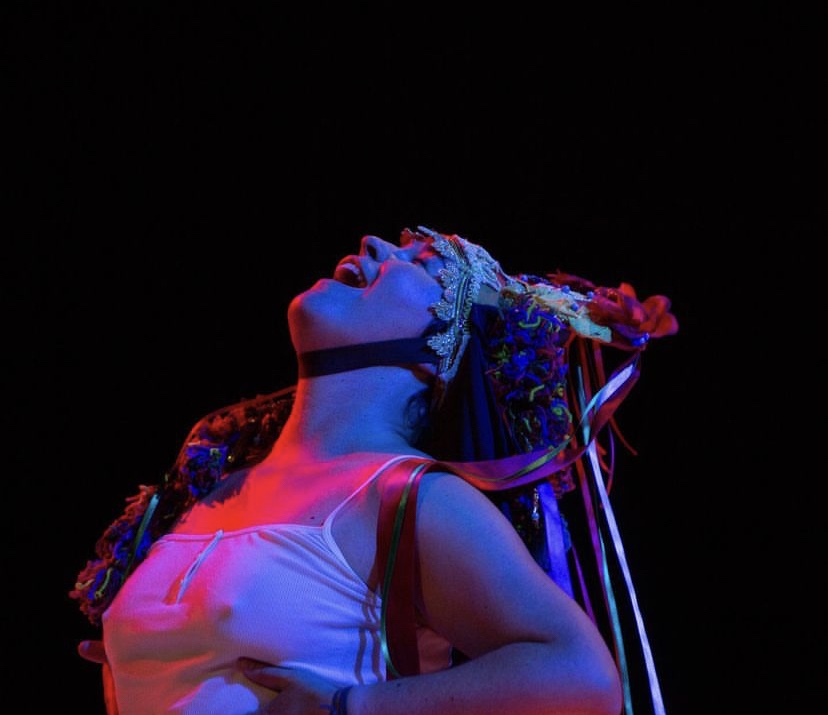Words by Josephine Leask. Performed at The Place on 23 February.
Artist, costume designer, performance artist and multiple other things, Katherina Radeva delights as she dances her heart out in her work 40/40. Part of this delight is in watching her accept who she is during her short, humorous and touching solo. The other part is being drawn into the story she tells of her life: embodied memories of her childhood in Bulgaria, her love of free-style dancing, life as a migrant artist in the UK and as a woman who has just turned 40.
Radeva enters, understated and hesitant, only to fill the space with her expansive presence. Taking a deep breath she steps resolutely onto her self-designed dance floor; a board game of squares with colourful tape marking abstract snakes, ladders and women’s bodies. The structure of her solo is simple. She dances to her favourite ‘go-to’ tracks, controls music and lighting cues while intermittently adding yellow and red taped lines to her board-game. Telling us she didn’t want to include spoken text, Radeva performs to detailed recorded voice notes punctuated by occasional live commentary. She’s an engaging storyteller, and although there’s nothing very sophisticated about her delivery or movement style, she has us transfixed with her unpretentious charm.
Her straight-talking honesty and ability to expose her body, vulnerabilities, joys and sadnesses without a blink of fear are remarkable. We sit intimately close and she connects warmly with each one of us, a look here, a raised eyebrow there, a shrug, a nod, unfazed, even while removing her clothes, or sweaty and out of breath after a dance. There’s a delicious naivety to both her monologue and how she approaches every action as if it were for the first time. As she dances to her special tracks, the complexities of her life unravel and we feel the fat shaming she received as a chubby child who wanted to dance and compete in gymnastic competitions, the loneliness of being a migrant, the difficulty of inhabiting a female body that is ageing and changing.
I realise that her dancing is more than a therapeutic release. It brings out her best and makes her feel the best enabling her to reclaim what she has lost, bringing her into the present and future with brave optimism. She dances for joy, sadness, to go crazy or for pure nostalgia. Choosing a beloved Balkan song Maki Maki by Goran Bregovi?, she puts on a Bulgarian headdress and performs a traditional Balkan celebration dance, historically led by men. Radeva relishes reclaiming the vigorous step sequences for herself, dismantling their patriarchal heritage. Whether she’s running on the spot to a frantic club anthem, undulating in swinging motions to Sweet Dreams (Are Made of This) or twerking to reggaetón, she moves efficiently and with assertive precision. Radeva articulates her emotions as clearly as her words and the dances enable a restorative process of picking herself up from shame, surviving hardship and accepting the struggles of ageing.
As well as being entertained, I feel like I’ve learnt something important from her personal testimony: a middle-aged woman giving herself permission to do what she dammed well wants. 40/40, made with the help of choreographer ‘legends’ Liz Aggiss, Lucy Suggate and Rachel Krische, adds Radeva to the ever-increasing canon of exciting, gutsy, maturing women dance artists who do as they please.
